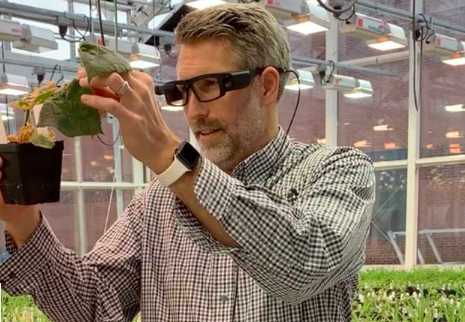In 2019, Bayer decided to team up with Iristick to research how crop field inspection and data collection could benefit from the use of smart glasses and its built-in voice technology. We have been working with Bayer ever since and we are more than proud that multiple business units are using the Iristick Z1 smart glasses model for crop inspections outdoors and in greenhouses.
Michael Calvillo, PhD, is a Senior Product Designer at Bayer Crop Science, US: "We’re focused on those tasked with collecting scientific data. Businesses today are all looking to construct prediction models and in that way we’re in lock step with the Amazons of the world. A lot of what we do, however, involves manual data collection outdoors, where I’m going out and gathering performance information about a specific crop. So, we have people out in the field using mobile data collection devices. What we learned is that while the software generally delivers the functionality they need, it’s the experience they’re struggling with: entering the raw data by hand, environmental factors (rain, heat), and needing to use one’s hands. There’s also the problem of setting the device down to manipulate a plant and picking it back up - combined with screen glare and small touch targets. It was a use case born out of a classic human-computer interaction problem."
Carrie Roy, Ph.D. is a Senior Product Designer with a focus on emerging technology: "I did a bit of research on the hardware out there, the kinds of screens, microphones and audio feedback available, and I started thinking how this workflow could work leveraging the capabilities of AR headsets. I created a storyboard of a person out in the field – they observe a certain rating, they say it, they see it for visual confirmation – and began drafting from there. We were essentially storyboarding the potential experience, talking to users to refine that, and looking at our hardware options.

Michael Calvillo: "Part of it was the ability for us to connect with vendors. Not all are accessible; some are more responsive than others. We were in an early stage of market definition and validation so we didn’t necessarily have real dollars to spend on evaluation units. We were trying to see if anyone would send us evaluation units free of charge. We ultimately went with Iristick who was willing to work with us and put a little of their own skin in the game."
Carrie Roy: "The ergonomics of the glasses and the security of a tethered solution also put them at the top of the list. We didn’t want to add another device that needed to get security approval. The processing, heat and weight are all still carried on the mobile unit itself, which made for a lightweight, comfortable pair of AR glasses. They’re safety-rated, too, and it just so happens that the side coverings (there’s a bit of a touch pad and camera covering the sides of the eyes) matched up with protecting our workers’ eyes from the corn leaves. So, that was a happy accident."
Do you have any advice for working with vendors or getting employees to adopt?
Carrie Roy: "Think carefully about if or how AR would really benefit the work that your company or users are doing. You don’t want to get technology that’s more than what you need. In terms of the field data we’re doing, informed reality (delivering a smaller heads-up display that mirrors what appears on the device screen) as opposed to a Hololens solution (delivery of translucent holographic data displays) is really a better fit. It’s just what we need, not more. These are very specific use cases that benefit from hands-free verbal data collection. As we’ve been developing around that, we’re seeing additional advantages like the ease of QR scanning and photo capture and tagging. Just ensuring that initial use case is a really good fit for the technology—that’s a good first step."
(Source: Emily Friedman, BrainXchange)
For the entire interview, go to https://www.brainxchange.com/enterprisewear-blog
Read how Bayer went in-depth on their Iristick smart glasses journey on the official EWTS2020 digital exhibition during a keynote session.